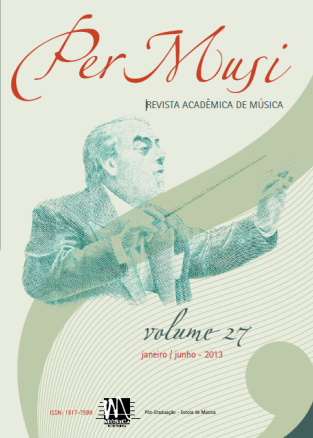De como La Llorona se tornou um Miserere de Willy Corrêa de Oliveira
Palavras-chave:
Willy Corrêa de Oliveira, Miserere, Metalinguagem, Memória musical, Música contemporânea brasileiraResumo
Em nossa pesquisa sobre o ciclo de peças para piano Miserere, de Willy Corrêa de Oliveira (DE BONIS, 2010) discutimos uma série de procedimentos composicionais pertinentes a essa obra e à produção do compositor em geral, a saber: a metalinguagem, a relação com as artes plásticas, a condensação de ideias, a superposição de citações à maneira de um ideograma, o teatro musical, e a possibilidade de uma análise estrutural de cada peça ao lado de uma leitura semântica (incentivada pela própria partitura). Obra aberta, o Miserere tem recebido adições do compositor após a publicação da pesquisa. As mesmas ferramentas de análise aplicadas para o ciclo todo são aqui utilizadas para o estudo de uma das últimas peças a serem acrescentadas, em 2009.
Referências
CAMPOS, Haroldo de (org.). Ideograma: lógica, poesia, linguagem. São Paulo: Cultrix; Edusp, 1994.
DE BONIS, Maurício. O Miserere de Willy Corrêa de Oliveira: “aporia” e “apodíctica”. São Paulo: Annablume, 2010.
MONTANDON, Rosa Maria Spinoso de. La Llorona: mito e poder no México. Tese (doutorado em história social). Niterói: Universidade Federal Fluminense, 2007.
OLIVEIRA, Willy Corrêa de. Caderno de Desenho. Manuscrito. Partitura.
______. Cinco advertências sobre a voragem. São Paulo: Luzes no Asfalto, 2010.
______. L’art d’être grand-père. Partitura.
______. Miserere. Manuscrito. Partitura.
______. Nove Peças Fáceis. São Paulo: Novas Metas, 1989.
______. Willy Corrêa de Oliveira, O presente. CD de áudio. Água-forte, 2006.
______. Passagens. São Paulo: Luzes no Asfalto, 2008.
______. Recife, Infância: Espelhos. São Paulo: Novas Metas, 1989.
______. Sete pequeninas peças para piano. São Paulo: Com-arte, 1996.
POUND, Ezra. Abc of reading. New York: New Directions Books, 1960.
POUSSEUR, Henri. Por uma periodicidade generalizada. In: Apoteose de Rameau e outros ensaios. São Paulo: Editora UNESP, 2009, p.111-170.
______. Composer (avec) des identités culturelles. In: Série et harmonie généralisées: une théorie de la composition musicale. Wavre: Mardaga, 2009, p.295-345.
WITTGENSTEIN, Ludwig. Tractatus logico-philosophicus. São Paulo: Edusp, 1968.
Downloads
Publicado
Edição
Seção
Licença

Este trabalho está licenciado sob uma licença Creative Commons Attribution 4.0 International License.

Exceto onde está indicado, o conteúdo neste site está sob uma Licença Creative Commons - Atribuição 4.0 Internacional.












